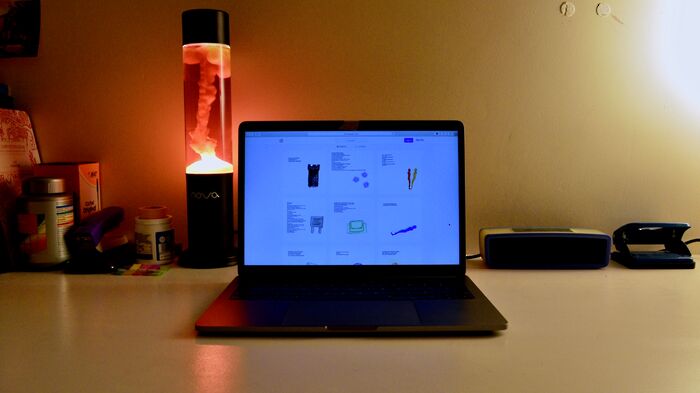DeskSpace: Critical Thinking
In her column DeskSpace Rachel Loughran, investigates the lives and working practices of Cambridge University members through a discussion prompted by their desk space. This week, Rachel sits down with second year HSPS student Mathilde Foged Jensen, to get critical about politically inspired spaces

“If you get a bit creative with space then you get contradictions,” Mathilde tells me as she ruffles the few loose papers on her desk. The juxtaposition of her well-ordered desk-top and the sprawling collage of collectables that climb the wall in front of it seems to echo her statement. Contradiction, it occurs to me, plays a contentious role in shaping the spaces that dictate University life. It is not an uncommon argument that the expansion of safe spaces across British universities has resulted in the narrowing of political spaces in which minority views can be expressed. The polarity of opinion matches the velocity of passion this debate engenders. In such an emotionally fraught climate, one wonders if it’s possible to foster a space where critical thinking can re-shape ideological division. Mathilde believes it is. I sit down with her in her room at Wolfson College to discuss how she has created a space which challenges herself and others to think critically.
Rachel Loughran: When you decided to choreograph this space, did you have a theme in mind? There’s a lot of things on the wall…
Mathilde Foged Jensen: I guess it reflects my mind – which is pretty messy! But yeah, I didn’t have a theme… it’s more just things that I enjoy, things that inspire me, things that provoke me, things that reflect who I am, like a mind map. It’s changed from last year. I could have chosen to put the old things back up, but I was like, ‘OK, clean slate, new year.’
RL: Do you feel that your desk space shows a sense of growth then?
MJ: It’s becoming more political, maybe there aren’t as many pictures of myself any more.
RL: Can you talk me through the political emphasis of the space?
“I think it makes people reflect on what is acceptable in the politically correct space of Cambridge”
MJ: I’m a great fan of Angela Merkel, whom you would see on my screensaver as well if you looked… Her picture reminds me of what she represents: democracy and stability. I think she’s an empowering woman.
RL: On the other side of the political spectrum, looking at the space it’s pretty hard to miss the Trump poster…
MJ: Yes, well how frank can I be… first of all I’m not a Trump supporter although that would be fun, no, joking aside, I have strategically put it [the poster] next to the window so that everyone outside can see it.
RL: What has the reaction to it been?
MJ: Some people really think I am a Trump supporter and that’s fine, but they don’t know how to react. It’s like: ‘Oh she’s the girl with the Trump poster.’ I think it makes people reflect on what is acceptable in the politically correct space of Cambridge, where we all tend to share the same liberal progressive mind-set… To have the stuff that aggravates people, and brings out some critical thinking is what I want… maybe we need some difference of opinion, maybe we need oppositional thoughts. You can see I have a Socialist postcard up there beside Trump, so I think there’s a lot of contradictions in this space. There’s other things too: I have some cards people have sent me, just to remind me that I have friends! And here’s an opinion piece I wrote for a Danish newspaper, to remind myself of my motivation to study.
RL: What is your motivation?
MJ: Yeah thank you for reminding me of that, I’m trying to work it out! I’m interested in society: that is why I’m engaging with political science. It’s important to have opinions about things, and these things [the items on the wall] keep reminding me of critical thinking. That should be the link between the things I see and the things I do.
RL: Do you think having this collage in front of you when you’re sitting at your desk helps shape your working practices?
MJ: Yes, definitely… When you write political stuff you have to link it to a greater context. It’s not just about writing essays, it’s about creating a framework that connects it all to a bigger picture. Political science is not about just reciting ideas or words, though that’s important too: English is not my mother tongue. I pin new words to the wall, it’s a good way of remembering them [pointing to a note] like ‘infallibility,’ that’s a new word.
RL: Ok, without looking, what does infallibility mean?
MJ: The inability to be wrong!
RL: Very apt, point proven.

 Music / The pipes are calling: the life of a Cambridge Organ Scholar25 April 2025
Music / The pipes are calling: the life of a Cambridge Organ Scholar25 April 2025 Arts / Plays and playing truant: Stephen Fry’s Cambridge25 April 2025
Arts / Plays and playing truant: Stephen Fry’s Cambridge25 April 2025 Comment / Cambridge builds up the housing crisis25 April 2025
Comment / Cambridge builds up the housing crisis25 April 2025 Interviews / Dr Ally Louks on going viral for all the wrong reasons25 April 2025
Interviews / Dr Ally Louks on going viral for all the wrong reasons25 April 2025 News / Candidates clash over Chancellorship25 April 2025
News / Candidates clash over Chancellorship25 April 2025






